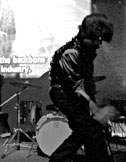
Comment
on this story
What:
Oneida with the Bitter Pills
When:
Tuesday, Oct. 16 at 9 p.m.
Where:
Pilot Light
Cost:
$4
|
|

Brooklyn art-rockers Oneida make some noise
by Matthew T. Everett
Fat Bobby, the keyboard player for the Brooklyn noise-rock band Oneida, is a generally easygoing guy. He's quick to forgive me after I missed his call for a scheduled interview, and he seems genuinely pleased to talk about his band and his music and life on the road when I finally get in touch with him an hour later. He's understanding when I tell him I've only listened to the band's 1999 CD Enemy Hogs and sheepishly admit that I haven't heard the new album, Anthem of the Moon.
"Enemy Hogs is fairly representative of what we sound like. It's eclectic and crazy," he says, while wandering around downtown Madison, Wis., looking for a quiet coffee shop before the band heads toward Milwaukee later that afternoon.
The only thing that seems to make Fat Bobby edgy at all is when I mention that several critics have tagged Oneida as part of the '60s garage rock revival, along with bands like the Delta 72 and the White Stripes.
"That's inaccurate," he says. "I know where that comes from. There was this one review on a web site that said we were a retro garage band, and everybody seems to have picked up on that. Maybe people are just lazy. I see that turning up in paper after paper. I mean, I love listening to the Seeds and the Mysterians, but I don't think our music has much to do with it."
Fat Bobby acknowledges that the psychedelic organ fills he plays may be responsible for the garage band label. But he's frustrated that the classification ignores the fairly complicated mix of noise and art rock that goes on underneath his keyboards.
Enemy Hogs sounds like a recording of a performance art piece. There's an epic workout of bleary-eyed psychedelica (the eight-minute "Wicked Servant"), a not-so-ironic almost-metal anthem, complete with a full choral accompaniment ("Turn It: Up [Loud]"), but the remaining half-hour is a collage of noise, swirling guitars and flailing drums and guttural vocals working in an unrestrained frenzy with a formal construction that only the band members fully recognize.
Oneida officially formed three or four years ago, Bobby says, growing out of a music and underground collective in Brooklyn's warehouse district. The band's drummer, Kid Millions, and guitarist/singer Papa Crazy recorded a few tracks with fellow underground musicians, released a record called A Place at El Shaddai's on the Turnbuckle record label, and then recruited Fat Bobby and bassist Hanoi Jane for a two-month tour.
"Part of the conditions for putting the record out was that they'd get an actual band together, instead of just having 25 guys with big amps who could play in New York, and go on a tour," Fat Bobby says. "Kid and Papa, they were the ones who really started this, and they asked a couple of us to join. How could we say no? Neither one of us was doing anything, so now we're a pretty cohesive unit."
The band roster may be well-defined now, but Oneida isn't following any particular path to major-label stardom. They followed the avant-garde Enemy Hogs with last year's Come On Everybody Let's Rock, a "completely sincere" collection on Jagjaguwar Records of what Fat Bobby calls "cock rock howlers," influenced by AC/DC, Black Sabbath, and Led Zeppelin. Before Come On Everybody Let's Rock, the band had already started work on the new record Anthem of the Moon, and they're working on a new record for the spring, Each One Teach One, a sprawling double LP of psychedelic drone rock, taken from the heavy-duty repetitive rhythms of their live shows.
"If you listen to our records, they all sound unalike," Fat Bobby says, emphasizing that each album has reflected "the process" of recording. "For us the end result of being in a band is to make everything we do totally honest in terms of what we're doing now. The last thing we want to be is professional. We want a new sound every time we record. If we're feeling something, we find a way to make it work. There's no intent to do that; it's just a natural result of committing yourself to making a record."
Fat Bobby says the different sounds on Oneida's records are all part of the larger experience of their live shows. The heavy metal references, the trance-rock workouts, the avant noise, the psychedelic explorations—all of that comes out when they're on stage, and it combines to make a sound that none of the records have quite matched. "Seeing us live is completely different," he says. "You're creating an object when you make a record, and that's not necessarily representative of a live presentation. From hearing our records, people are usually surprised at how loud and heavy we are. It either puts them in a frenzy or a coma."

October 11, 2001 * Vol. 11, No. 41
© 2001 Metro Pulse
|